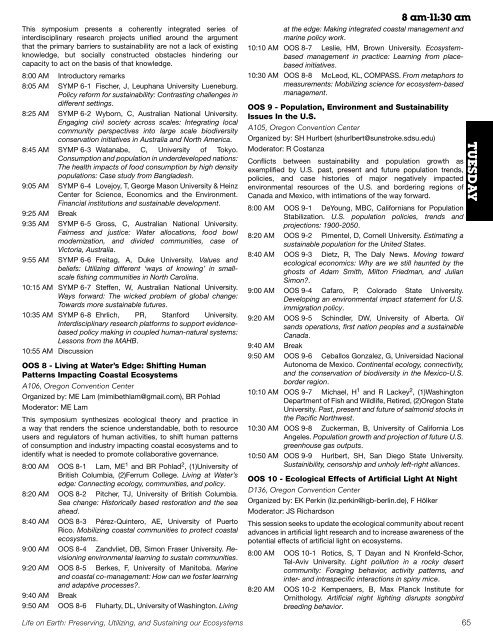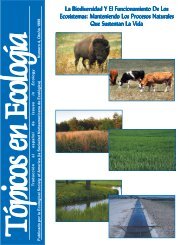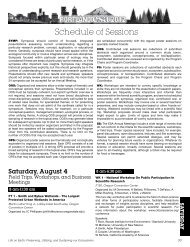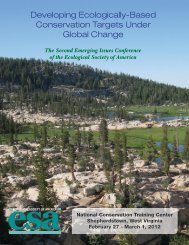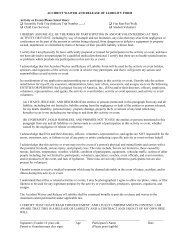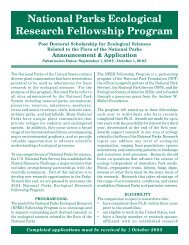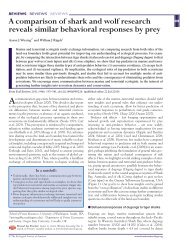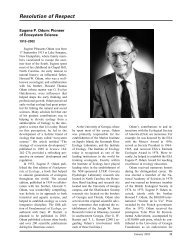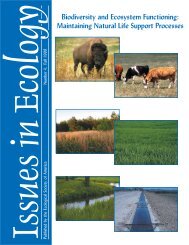Printed Program (PDF) - Ecological Society of America
Printed Program (PDF) - Ecological Society of America
Printed Program (PDF) - Ecological Society of America
You also want an ePaper? Increase the reach of your titles
YUMPU automatically turns print PDFs into web optimized ePapers that Google loves.
This symposium presents a coherently integrated series <strong>of</strong><br />
interdisciplinary research projects unified around the argument<br />
that the primary barriers to sustainability are not a lack <strong>of</strong> existing<br />
knowledge, but socially constructed obstacles hindering our<br />
capacity to act on the basis <strong>of</strong> that knowledge.<br />
8:00 AM Introductory remarks<br />
8:05 AM SYMP 6-1 Fischer, J, Leuphana University Lueneburg.<br />
Policy reform for sustainability: Contrasting challenges in<br />
different settings.<br />
8:25 AM SYMP 6-2 Wyborn, C, Australian National University.<br />
Engaging civil society across scales: Integrating local<br />
community perspectives into large scale biodiversity<br />
conservation initiatives in Australia and North <strong>America</strong>.<br />
8:45 AM SYMP 6-3 Watanabe, C, University <strong>of</strong> Tokyo.<br />
9:05 AM<br />
Consumption and population in underdeveloped nations:<br />
The health impacts <strong>of</strong> food consumption by high density<br />
populations: Case study from Bangladesh.<br />
SYMP 6-4 Lovejoy, T, George Mason University & Heinz<br />
Center for Science, Economics and the Environment.<br />
Financial institutions and sustainable development.<br />
9:25 AM Break<br />
9:35 AM SYMP 6-5 Gross, C, Australian National University.<br />
Fairness and justice: Water allocations, food bowl<br />
modernization, and divided communities, case <strong>of</strong><br />
Victoria, Australia.<br />
9:55 AM SYMP 6-6 Freitag, A, Duke University. Values and<br />
beliefs: Utilizing different ‘ways <strong>of</strong> knowing’ in smallscale<br />
fishing communities in North Carolina.<br />
10:15 AM SYMP 6-7 Steffen, W, Australian National University.<br />
Ways forward: The wicked problem <strong>of</strong> global change:<br />
Towards more sustainable futures.<br />
10:35 AM SYMP 6-8 Ehrlich, PR, Stanford University.<br />
Interdisciplinary research platforms to support evidencebased<br />
policy making in coupled human-natural systems:<br />
Lessons from the MAHB.<br />
10:55 AM Discussion<br />
OOS 8 - Living at Water’s Edge: Shifting Human<br />
Patterns Impacting Coastal Ecosystems<br />
A106, Oregon Convention Center<br />
Organized by: ME Lam (mimibethlam@gmail.com), BR Pohlad<br />
Moderator: ME Lam<br />
This symposium synthesizes ecological theory and practice in<br />
a way that renders the science understandable, both to resource<br />
users and regulators <strong>of</strong> human activities, to shift human patterns<br />
<strong>of</strong> consumption and industry impacting coastal ecosystems and to<br />
identify what is needed to promote collaborative governance.<br />
8:00 AM OOS 8-1 Lam, ME1 and BR Pohlad2 , (1)University <strong>of</strong><br />
British Columbia, (2)Ferrum College. Living at Water’s<br />
edge: Connecting ecology, communities, and policy.<br />
8:20 AM OOS 8-2 Pitcher, TJ, University <strong>of</strong> British Columbia.<br />
Sea change: Historically based restoration and the sea<br />
ahead.<br />
8:40 AM OOS 8-3 Pérez-Quintero, AE, University <strong>of</strong> Puerto<br />
Rico. Mobilizing coastal communities to protect coastal<br />
ecosystems.<br />
9:00 AM OOS 8-4 Zandvliet, DB, Simon Fraser University. Revisioning<br />
environmental learning to sustain communities.<br />
9:20 AM OOS 8-5 Berkes, F, University <strong>of</strong> Manitoba. Marine<br />
and coastal co-management: How can we foster learning<br />
and adaptive processes?.<br />
9:40 AM Break<br />
9:50 AM OOS 8-6 Fluharty, DL, University <strong>of</strong> Washington. Living<br />
Life on Earth: Preserving, Utilizing, and Sustaining our Ecosystems<br />
8 am-11:30 am<br />
at the edge: Making integrated coastal management and<br />
marine policy work.<br />
10:10 AM OOS 8-7 Leslie, HM, Brown University. Ecosystembased<br />
management in practice: Learning from placebased<br />
initiatives.<br />
10:30 AM OOS 8-8 McLeod, KL, COMPASS. From metaphors to<br />
measurements: Mobilizing science for ecosystem-based<br />
management.<br />
OOS 9 - Population, Environment and Sustainability<br />
Issues In the U.S.<br />
A105, Oregon Convention Center<br />
Organized by: SH Hurlbert (shurlbert@sunstroke.sdsu.edu)<br />
Moderator: R Costanza<br />
Conflicts between sustainability and population growth as<br />
exemplified by U.S. past, present and future population trends,<br />
policies, and case histories <strong>of</strong> major negatively impacted<br />
environmental resources <strong>of</strong> the U.S. and bordering regions <strong>of</strong><br />
Canada and Mexico, with intimations <strong>of</strong> the way forward.<br />
8:00 AM OOS 9-1 DeYoung, MBC, Californians for Population<br />
Stabilization. U.S. population policies, trends and<br />
projections: 1900-2050.<br />
8:20 AM OOS 9-2 Pimentel, D, Cornell University. Estimating a<br />
sustainable population for the United States.<br />
8:40 AM OOS 9-3 Dietz, R, The Daly News. Moving toward<br />
ecological economics: Why are we still haunted by the<br />
ghosts <strong>of</strong> Adam Smith, Milton Friedman, and Julian<br />
Simon?.<br />
9:00 AM OOS 9-4 Cafaro, P, Colorado State University.<br />
Developing an environmental impact statement for U.S.<br />
immigration policy.<br />
9:20 AM OOS 9-5 Schindler, DW, University <strong>of</strong> Alberta. Oil<br />
sands operations, first nation peoples and a sustainable<br />
Canada.<br />
9:40 AM Break<br />
9:50 AM OOS 9-6 Ceballos Gonzalez, G, Universidad Nacional<br />
Autonoma de Mexico. Continental ecology, connectivity,<br />
and the conservation <strong>of</strong> biodiversity in the Mexico-U.S.<br />
border region.<br />
10:10 AM OOS 9-7 Michael, H1 and R Lackey2 , (1)Washington<br />
Department <strong>of</strong> Fish and Wildlife, Retired, (2)Oregon State<br />
University. Past, present and future <strong>of</strong> salmonid stocks in<br />
the Pacific Northwest.<br />
10:30 AM OOS 9-8 Zuckerman, B, University <strong>of</strong> California Los<br />
Angeles. Population growth and projection <strong>of</strong> future U.S.<br />
greenhouse gas outputs.<br />
10:50 AM OOS 9-9 Hurlbert, SH, San Diego State University.<br />
Sustainibility, censorship and unholy left-right alliances.<br />
OOS 10 - <strong>Ecological</strong> Effects <strong>of</strong> Artificial Light At Night<br />
D136, Oregon Convention Center<br />
Organized by: EK Perkin (liz.perkin@igb-berlin.de), F Hölker<br />
Moderator: JS Richardson<br />
This session seeks to update the ecological community about recent<br />
advances in artificial light research and to increase awareness <strong>of</strong> the<br />
potential effects <strong>of</strong> artificial light on ecosystems.<br />
8:00 AM OOS 10-1 Rotics, S, T Dayan and N Kronfeld-Schor,<br />
Tel-Aviv University. Light pollution in a rocky desert<br />
community: Foraging behavior, activity patterns, and<br />
inter- and intraspecific interactions in spiny mice.<br />
8:20 AM OOS 10-2 Kempenaers, B, Max Planck Institute for<br />
Ornithology. Artificial night lighting disrupts songbird<br />
breeding behavior.<br />
TUESDAY<br />
65


